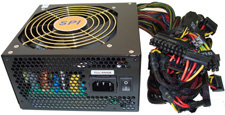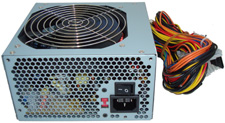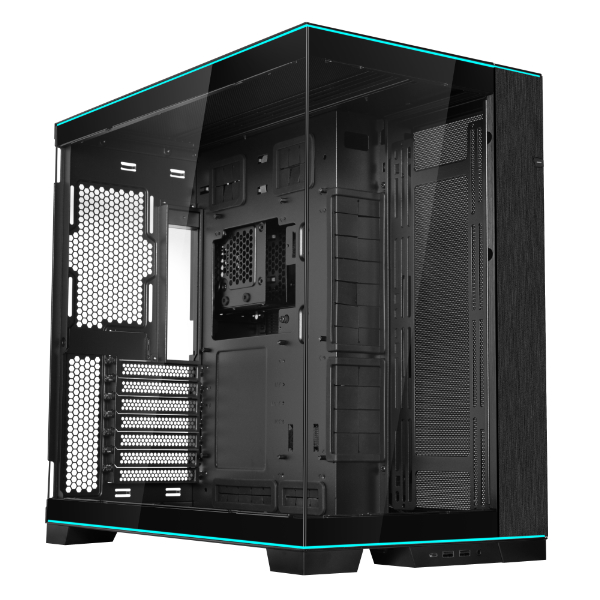How to choose a power supply unit for a PC
Stability and quality of the PSU are critical
Some might view the power supply unit as the most boring component of the lot. But with no power...! Anyway, the most important attribute needed after sufficient wattage is stability. Which really means choosing a manufacturer with a reputation for quality.
Get reserve power and spare connectors for upgrades

It's clearly important to have enough wattage and matching connectors for what's currently installed, but a PSU should have reserve power and spare connectors for components you might add in the future. We think the PSU should allow for upgrading to the next level of technology without having to change the PSU. For example, while a PSU with 350 watts is fine for most PCs without a video card, the PSU should have have enough reserve power and a spare PCI Express connector to add a separate powerful video card in the future. That would be a 450W to 500W PSU with a spare 6 pin or 8 pin PCI Express connector.
For a gaming PC that currently sports a mid-level video card, the PSU should have reserve power and a second PCI Express connector for upgrading to a high-end video card in the future. That would be a 500W PSU with two 6 pin or 8 pin PCI Express connectors. There is good news here, some new high end video cards are dropping their power needs substantially like the Nvidia GeForce GTX 970 which requires only a 500W PSU!
You would only need a 600W PSU or higher wattage with two 6 pin, or one 6 pin and one 8 pin, or two 8 pin PCI Express connectors for progressively higher end video cards that cost $300 and higher for the video cards. The wattage requirement information for a video card is published on the website of the video card manufacturer.
Keep in mind that under utilized power capacity doesn't help performance in any way and PSUs with high wattage are expensive. Money saved by selecting a wattage with sufficient head room for expansion but no more, will be better spent on a more powerful CPU, graphics or memory. Also a PC needs balance, for example upgrading the video card to an extreme card that needs a lot of power while keeping the CPU the same will create bottle necks, and you might not want to upgrade all parts or you're talking almost the cost of a new PC. So you don't need to plan the PSU for the most extreme upgrades either.

A single +12V rail PSU or a multi +12V rails PSU
Skip this para if you don't want too much techno talk! A rail is a group of PSU wires and connectors that are monitored for the total current drawn from them collectively. The PSU shuts down (OCP protection) if the total current drawn for that group or rail exceeds a fixed limit. This shut down limit is typically higher on a single +12V rail PSU compared to each +12V rail on a multi +12V rail PSU. So you can connect more components to a single +12V rail PSU compared to what you can connect to one +12V rail on a multi +12V rail PSU. Obviously you can connect more components in total to a multi +12V rail PSU using all the rails. The benefit of a multi +12V rail PSU is that it offers you more protection.
Thoroughly confused by that convoluted last para, here's the actionable part! Get a single +12V rail PSU up to a 500W PSU. This allows you to use or upgrade to a single powerful video card in that PC without the PSU shutting down, as long as the total wattage of the PSU meets or exceeds the minimum requirements for the video card. For example a single +12V rail 500W PSU can handle a GTX 970 video card!
Get two +12V rails or more above a 500W PSU for an extreme gaming PC. This allows you to use or upgrade to dual or more video cards so each card can draw sufficient current from it's own +12V rail. Of course again the total wattage of the PSU must meet or exceed the minimum requirements for all the video cards, and the PSU should have sufficient connectors on each +12V rail for the video card it supplies current to.
Quiet PSU fan for cooling
Cooling is a factor and a large 12cm exhaust fan included in the PSU moves a lot of air keeping the PSU and the computer cooler. However the noise of the PSU fan is a critical issue. You don't want to hear the whirring or whining of the fan. It'll ruin your whole PC experience. Here again, a quality PSU manufacturer will pay attention to this important detail and give you a quiet almost silent fan. That's another reason to pay up for a quality PSU manufacturer.
PSU Connectors
Make sure your PSU has spare connectors for future upgrades. For a mainstream PC for its SATA hard drives and DVD drives you would want at least 4 SATA connectors, for potentially a DVD drive , a Blu-ray DVD drive, a hard drive and a solid state drive (SSD). For a higher end PC, 5 or 6 SATA connectors should be fine. For video card connectors that's been covered above.
You also might want for a power or gaming PC a PSU with a 4+4 pin CPU power connector and not just a 4 pin CPU power connector in case you want to upgrade the motherboard at a future date.
Modular connectors are nice, you only use the wires you want and that reduces clutter and potentially increases air flow, but they're not necessary and are more expensive PSUs.








